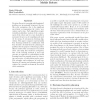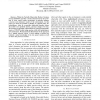252 search results - page 11 / 51 » Learning Partially Observable Action Models: Efficient Algor... |
UAI
2001
15 years 1 months ago
2001
There exist a number of reinforcement learning algorithms which learn by climbing the gradient of expected reward. Their long-run convergence has been proved, even in partially ob...
CVPR
2009
IEEE
16 years 6 months ago
2009
IEEE
We propose a novel approach to designing algorithms for
object tracking based on fusing multiple observation models.
As the space of possible observation models is too large
for...
101
click to vote
ICML
2000
IEEE
16 years 14 days ago
2000
IEEE
Decision-theoretic reasoning and planning algorithms are increasingly being used for mobile robot navigation, due to the signi cant uncertainty accompanying the robots' perce...
116
click to vote
AAAI
2000
15 years 1 months ago
2000
Given a model of a physical process and a sequence of commands and observations received over time, the task of an autonomous controller is to determine the likely states of the p...
ICRA
2007
IEEE
15 years 6 months ago
2007
IEEE
— While the Partially Observable Markov Decision Process (POMDP) provides a formal framework for the problem of robot control under uncertainty, it typically assumes a known and ...


